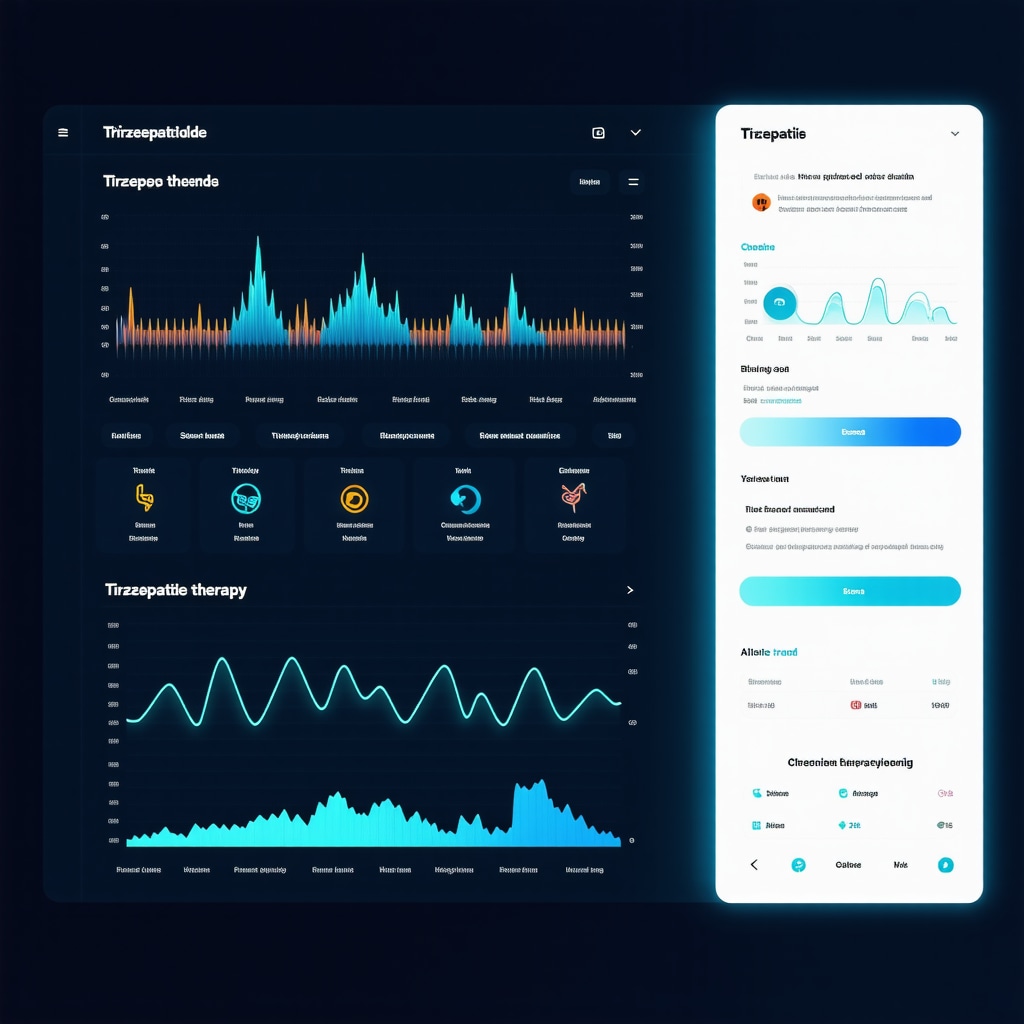Revolutionizing Weight Loss: The Promise of Tirzepatide in New Jersey
In the evolving landscape of obesity medicine, tirzepatide weight loss therapies have emerged as a beacon of hope for many struggling with stubborn fat and metabolic health challenges in New Jersey. This innovative medication, a dual GIP and GLP-1 receptor agonist, offers a sophisticated hormonal approach that transcends traditional weight loss methods, promising not only significant fat reduction but also improvement in overall metabolic function. As the demand rises for personalized, effective weight loss solutions, understanding how tirzepatide integrates into tailored treatment plans becomes essential for lasting results.
Crafting Personalized Tirzepatide Weight Loss Programs in NJ
Every individual’s weight loss journey is unique, shaped by genetics, lifestyle, and health status. In New Jersey, expert obesity medicine practitioners design tirzepatide weight loss plans tailored for individual success that account for these nuances. These programs typically combine medically supervised tirzepatide injections with comprehensive lifestyle guidance, including nutrition counseling and physical activity recommendations, optimizing the medication’s effectiveness while supporting sustainable habits.
How Does Tirzepatide Work to Unlock Fat Loss Differently?
Unlike conventional weight loss drugs, tirzepatide uniquely targets two incretin hormones: glucose-dependent insulinotropic polypeptide (GIP) and glucagon-like peptide-1 (GLP-1). This dual action enhances insulin secretion, slows gastric emptying, and reduces appetite more efficiently, creating a powerful synergy that promotes fat loss and improves glycemic control. Clinical trials have demonstrated superior weight loss outcomes compared to GLP-1 agonists alone, positioning tirzepatide as a leading choice for patients seeking transformative results in New Jersey’s weight loss clinics.
Integrating Tirzepatide Safely: The Role of Physician Supervision
Effective and safe administration of tirzepatide requires expert medical oversight. New Jersey’s weight loss doctors meticulously evaluate each patient’s medical history, current health, and weight loss goals before initiating therapy. Regular monitoring during treatment helps manage potential side effects such as gastrointestinal discomfort and ensures dosage adjustments align with patient response. This approach aligns with NJ’s expert guide to safe tirzepatide injections, emphasizing safety and efficacy in every step.
Harnessing Tirzepatide Programs for Long-Term Lifestyle Transformation
Weight loss with tirzepatide in NJ is not merely about shedding pounds but about fostering a holistic lifestyle shift. Personalized plans encourage patients to adopt sustainable dietary changes, increase physical activity, and build resilience against weight regain. This comprehensive strategy, supported by motivational interviewing and behavioral counseling, enhances adherence and magnifies the benefits of tirzepatide therapy, ultimately leading to enduring health improvements.
Ready to explore personalized tirzepatide weight loss plans in New Jersey? Connect with expert providers today and embark on a transformative journey tailored just for you.
Authoritative Resource to Deepen Your Understanding
For a detailed scientific perspective on tirzepatide’s mechanism and clinical efficacy, consult the New England Journal of Medicine’s landmark study on tirzepatide in type 2 diabetes and obesity treatment. This peer-reviewed research underpins tirzepatide’s FDA approval and highlights its potential in metabolic medicine.
Embracing the Emotional Journey with Tirzepatide
Weight loss is not just a physical transformation; it’s deeply emotional and psychological. When I first started my tirzepatide journey, I was surprised by how much my mindset influenced my progress. There were days when the scale didn’t budge, and frustration crept in. But understanding that tirzepatide helps regulate appetite and glucose metabolism gave me reassurance to stay the course. The support from my healthcare provider in New Jersey, who closely monitored my progress, was invaluable in maintaining motivation and adjusting treatments when needed. This personalized care approach mirrors what many NJ clinics emphasize in expert tirzepatide consultations, ensuring patients feel empowered throughout their journey.
Balancing Tirzepatide with Lifestyle Changes: My Practical Approach
One insight I gained is that tirzepatide works best when combined with realistic lifestyle changes rather than drastic overhauls. I focused on small, manageable shifts: swapping out sugary snacks for fruit, incorporating short walks during breaks, and prioritizing hydration. These incremental changes, supported by the appetite regulation effects of tirzepatide, created a sustainable rhythm. This experience aligns with clinical findings that highlight the importance of combining pharmacotherapy with behavioral strategies for optimal weight loss outcomes (source: obesity medicine advances in NJ).
What Are the Real-Life Challenges When Starting Tirzepatide?
Many wonder about the initial adjustment period and potential side effects. From personal experience and shared patient stories, common challenges include mild nausea, occasional fatigue, or injection-site reactions. However, these side effects typically diminish within weeks as the body adapts. Open communication with your NJ weight loss doctor can help tailor dosages and provide coping strategies. Have you experienced any surprising effects or found tips that eased your transition? Sharing your story could help others navigating this path.
The Importance of Community and Support Networks
Beyond medical treatment, the emotional uplift from connecting with others on similar journeys cannot be overstated. Joining local support groups or online communities in New Jersey helped me stay accountable and inspired. Hearing success stories and discussing setbacks made the process less isolating. If you’re interested, many NJ clinics offer group sessions alongside personalized tirzepatide plans, creating a comprehensive support system (learn more about NJ tailored tirzepatide programs).
Have insights or experiences with tirzepatide weight loss in NJ? Feel free to reach out or leave a comment below — your journey could inspire and guide others!
Unlocking the Full Potential of Tirzepatide: Precision Dosing and Adaptive Protocols
Maximizing tirzepatide’s efficacy demands more than standard dosing schedules; it requires a nuanced, patient-centric approach. In New Jersey’s cutting-edge weight loss clinics, practitioners employ precision titration protocols that adapt to individual pharmacodynamic responses and tolerability profiles. This method not only mitigates adverse events such as nausea but also sustains patient adherence, facilitating continuous metabolic improvements. Recent pharmacokinetic modeling suggests that tailoring dose escalation rates based on biomarkers like fasting glucose and appetite hormone fluctuations can enhance outcomes significantly (source: NIH pharmacokinetic study on tirzepatide).
Harnessing Biomarkers and Metabolic Phenotyping to Personalize Tirzepatide Therapy
Beyond clinical parameters, integrating metabolic phenotyping into tirzepatide treatment plans represents the frontier of personalized obesity medicine. Advanced assessments—including insulin sensitivity indices, adipokine profiles, and gut microbiome composition—enable clinicians to predict therapeutic response and tailor interventions. For instance, patients exhibiting higher baseline insulin resistance may benefit from adjusted dosing or adjunct therapies to potentiate tirzepatide’s glucose-lowering effects. This precision medicine paradigm is rapidly gaining traction in New Jersey’s obesity medicine landscape.
How Can Advanced Biomarkers Guide Tirzepatide Dose Adjustments for Optimal Fat Loss?
Understanding the interplay of biomarkers such as C-peptide, leptin, and GLP-1 receptor expression can inform dynamic dose modulation strategies. Elevated leptin levels might indicate resistance that requires complementary lifestyle strategies, while C-peptide measurements reflect endogenous insulin secretion capacity, guiding metabolic optimization. Clinicians leverage this data to calibrate tirzepatide dosing schedules, balancing efficacy and safety to achieve maximal fat loss without compromising patient well-being.
Synergistic Combination Therapies: Expanding the Horizon Beyond Monotherapy
Emerging evidence supports combining tirzepatide with adjunctive pharmacotherapies or nutraceuticals targeting complementary pathways. Agents like SGLT2 inhibitors or amylin analogs may enhance glycemic control and appetite suppression synergistically. In New Jersey, select weight loss programs integrate such combination regimens under strict medical supervision, with ongoing monitoring to preempt potential drug-drug interactions and cumulative side effects. This holistic approach reflects an expert-level commitment to optimizing patient-specific metabolic outcomes.
Leveraging Digital Health Tools for Real-Time Tirzepatide Therapy Optimization
Digital health innovations offer unprecedented opportunities to refine tirzepatide treatment dynamically. Continuous glucose monitoring (CGM) systems, wearable activity trackers, and mobile health platforms enable clinicians to capture granular data on glycemic trends, physical activity, and dietary patterns. This data-driven feedback loop supports timely dose adjustments and personalized coaching. New Jersey’s progressive clinics are pioneering such tech-enabled care models, enhancing patient engagement and therapeutic precision.

What Role Does Continuous Glucose Monitoring Play in Enhancing Tirzepatide Weight Loss Outcomes?
CGM provides real-time insights into glycemic variability and postprandial excursions, critical metrics for fine-tuning tirzepatide therapy. By correlating glucose patterns with medication timing and lifestyle factors, clinicians can adjust dosing to optimize metabolic control and minimize hypoglycemia risk. Moreover, patients gain empowerment through immediate feedback, fostering adherence and behavioral modifications that complement pharmacotherapy.
Engage with New Jersey’s leading obesity medicine experts to explore these advanced tirzepatide optimization strategies tailored for your unique metabolic profile. Schedule a consultation today and elevate your weight loss journey to a new level of precision and effectiveness.
Precision Medicine Meets Tirzepatide: Unlocking Individual Metabolic Signatures
As tirzepatide therapy matures within New Jersey’s obesity treatment realm, the integration of precision medicine stands at the forefront. Clinicians increasingly utilize comprehensive metabolic phenotyping—encompassing genetic markers, insulin resistance indices, and adipokine profiles—to tailor tirzepatide regimens that align with patients’ unique physiological landscapes. This evolution enhances therapeutic responsiveness and mitigates adverse effects, marking a paradigm shift from one-size-fits-all dosing to bespoke metabolic modulation.
Navigating Complexities: Managing Tirzepatide-Related Gastrointestinal and Metabolic Effects
While tirzepatide’s dual receptor agonism confers potent weight loss and glycemic benefits, it also necessitates vigilant management of gastrointestinal symptoms such as nausea, vomiting, and early satiety. Expert providers in New Jersey employ phased titration and adjunctive dietary interventions, including low-residue meals and hydration optimization, to ameliorate intolerance. Furthermore, recognizing and addressing rare metabolic perturbations, such as transient hypoglycemia or pancreatitis risk, underscores the critical role of multidisciplinary oversight.
How Do Pharmacogenomics Influence Tirzepatide Efficacy and Safety Profiles?
Emerging research in pharmacogenomics reveals genetic polymorphisms in incretin receptor pathways may modulate individual responses to tirzepatide. Variants affecting GLP-1 receptor sensitivity or GIP receptor expression can dictate therapeutic outcomes and side effect susceptibility. Incorporating genotypic screening in clinical practice could refine candidate selection and optimize dosing frameworks. This frontier is currently under exploration at leading institutions, as detailed in the NIH’s pharmacogenomics review on incretin-based therapies.
Synergistic Nutritional Interventions to Amplify Tirzepatide’s Metabolic Impact
Beyond pharmacotherapy, dietary strategies tailored to complement tirzepatide’s mechanisms can potentiate fat loss and metabolic health. Emphasizing low-glycemic index foods, omega-3 fatty acids, and fermentable fibers supports gut microbiota diversity and insulin sensitivity. In New Jersey weight loss programs, registered dietitians collaborate closely with medical teams to develop individualized meal plans that synergize with tirzepatide’s appetite-suppressing and insulinotropic effects, fostering enhanced adherence and outcomes.
Harnessing Artificial Intelligence for Dynamic Tirzepatide Treatment Optimization
Innovative AI-driven platforms analyze integrated patient data streams—from continuous glucose monitors to lifestyle inputs—to generate predictive models that forecast tirzepatide response trajectories. Such technology enables clinicians to anticipate dose adjustments preemptively, customize intervention timing, and personalize behavioral prompts. New Jersey’s pioneering clinics are at the vanguard of implementing these digital health solutions, exemplifying a future where machine learning augments clinical judgment.

In What Ways Does Integrative Digital Monitoring Improve Tirzepatide Safety and Compliance?
Integrative digital monitoring systems consolidate biometric data, medication adherence logs, and patient-reported outcomes into unified dashboards. This real-time visibility permits early detection of adverse events, facilitates timely clinical interventions, and fosters patient engagement through tailored feedback mechanisms. The result is a measurable enhancement in safety profiles and sustained treatment compliance, crucial for long-term weight management success.
Discover how these cutting-edge approaches can redefine your tirzepatide weight loss journey in New Jersey. Connect with our specialists today to access personalized, technology-enhanced obesity medicine strategies.
Frequently Asked Questions (FAQ)
What is tirzepatide, and how does it differ from other weight loss medications?
Tirzepatide is a novel dual agonist targeting both GIP and GLP-1 receptors, enhancing insulin secretion, reducing appetite, and slowing gastric emptying. Unlike traditional GLP-1 agonists, its dual mechanism offers superior weight loss and glycemic control, making it a breakthrough in obesity and metabolic therapy.
Who is an ideal candidate for tirzepatide weight loss therapy in New Jersey?
Ideal candidates typically include adults with obesity (BMI ≥30) or overweight individuals with comorbidities such as type 2 diabetes or metabolic syndrome. A thorough medical evaluation by a New Jersey obesity medicine specialist determines suitability based on individual health status and goals.
How is tirzepatide administered, and what does a typical treatment plan look like?
Tirzepatide is administered via once-weekly subcutaneous injections. Treatment plans are personalized with careful dose titration to optimize efficacy and minimize side effects, combined with lifestyle interventions like diet and exercise to maximize sustainable fat loss.
What are the common side effects, and how can they be managed?
Common side effects include mild gastrointestinal symptoms such as nausea, vomiting, and early satiety, often transient during the initial weeks. Management strategies include gradual dose escalation, dietary adjustments, hydration optimization, and close monitoring by healthcare providers.
Can tirzepatide be combined with other medications or therapies?
Yes, tirzepatide may be combined with other pharmacotherapies like SGLT2 inhibitors or nutraceuticals under strict medical supervision to enhance metabolic outcomes. Multidisciplinary coordination is essential to avoid drug interactions and cumulative adverse effects.
How does continuous glucose monitoring (CGM) enhance tirzepatide therapy?
CGM provides real-time glycemic data, allowing clinicians to fine-tune dosing and lifestyle recommendations dynamically. This technology supports improved metabolic control, reduces hypoglycemia risk, and empowers patients through immediate feedback.
Are genetic factors considered in tirzepatide treatment personalization?
Emerging pharmacogenomic insights suggest genetic variations can influence response and tolerability. While routine genotyping is not yet standard, advanced clinics may incorporate genetic screening to optimize dosing and predict outcomes.
What role do biomarkers and metabolic phenotyping play in therapy optimization?
Biomarkers like insulin sensitivity indices, leptin levels, and gut microbiome profiles inform individualized dosing and adjunct therapies, enhancing efficacy and minimizing side effects. This precision medicine approach is increasingly integrated into New Jersey’s weight loss programs.
How important is lifestyle modification alongside tirzepatide treatment?
Lifestyle changes are critical to augment pharmacotherapy benefits. Sustainable dietary improvements, physical activity, and behavioral counseling synergize with tirzepatide’s effects to promote long-term weight maintenance and metabolic health.
What support systems are available for patients undergoing tirzepatide therapy in New Jersey?
Many clinics offer comprehensive support including personalized consultations, group sessions, digital health tools, and community networks to enhance adherence, motivation, and emotional well-being throughout the weight loss journey.
Trusted External Sources
New England Journal of Medicine (NEJM): Provides seminal peer-reviewed clinical trials on tirzepatide’s efficacy and safety, underpinning FDA approvals and therapeutic guidelines.
National Institutes of Health (NIH) PubMed Central: Offers extensive pharmacokinetic, pharmacogenomic, and metabolic research articles essential for understanding tirzepatide’s mechanisms and personalized medicine applications.
American Obesity Society (AOS): An authoritative body delivering clinical practice guidelines, expert consensus, and updates on obesity pharmacotherapy including tirzepatide.
Endocrine Society Clinical Practice Guidelines: Comprehensive resources detailing endocrinological perspectives on obesity management and incretin-based therapies.
Obesity Medicine Association (OMA): Specialized in obesity treatment advancements, providing evidence-based protocols and continuing education specifically relevant to clinicians implementing tirzepatide therapy.
Conclusion: Advancing Weight Loss with Tirzepatide in New Jersey
Tirzepatide represents a paradigm shift in obesity medicine, uniquely combining dual incretin receptor agonism to deliver unprecedented fat loss and metabolic improvements. New Jersey’s expert clinicians harness precision medicine strategies—including biomarker profiling, pharmacogenomics, and digital monitoring—to tailor tirzepatide therapy for maximal efficacy and safety. Integrating personalized pharmacotherapy with sustainable lifestyle modifications and robust support systems fosters not only significant weight reduction but also durable health transformation. As this innovative treatment becomes more accessible, individuals facing obesity challenges in New Jersey are empowered to embark on scientifically advanced, individualized journeys toward lasting wellness.
Ready to take the next step? Share your thoughts, consult with our NJ specialists, and explore related expert content to unlock your full health potential with tirzepatide today.


I find the dual mechanism of tirzepatide fascinating, especially how it targets both GIP and GLP-1 receptors to enhance fat loss and glycemic control. This seems like a major step forward compared to traditional weight loss drugs that usually only focus on one pathway. Reading about how New Jersey clinics combine tirzepatide therapy with lifestyle counseling really resonates with me because I’ve learned that medication alone often isn’t enough. The comprehensive approach, including personalized nutrition advice and behavioral support, seems essential for sustainable results.
One thing I’m curious about is the role of the initial adjustment period. The article mentions side effects like mild nausea and fatigue, which can be discouraging for patients starting this treatment. From what I’ve gathered, having open communication with the healthcare provider and gradual dose adjustments can make a huge difference. Has anyone here navigated those early challenges? What strategies did you find most helpful to stay motivated during that phase?
Also, the integration of digital health tools like continuous glucose monitoring sounds promising for fine-tuning treatment. I wonder if these technologies are broadly available in NJ clinics and how patients adapt to using them. It feels like they could really empower patients by providing immediate feedback and enhancing adherence. Would love to hear thoughts or experiences from others who have tried tirzepatide programs or are considering it in New Jersey!
I appreciate the comprehensive overview of tirzepatide and its tailored approach to weight loss in New Jersey. It’s exciting to see how advanced biomarkers and digital health tools are becoming integral to optimizing treatment. I’ve seen firsthand how personalized dosing, based on genetic and metabolic profiles, can make a real difference in patient outcomes. It’s a clear move toward more precise, effective therapies.
However, I wonder about the accessibility of these sophisticated diagnostics and continuous monitoring devices. Are they becoming standard in NJ clinics, or are they still predominantly available in specialized centers? For many patients, cost and insurance coverage might limit their use, which could affect broader adoption of these personalized strategies.
In your experience, how are clinics balancing cutting-edge technology with practical accessibility? And do you see a future where such personalized care becomes the norm for most weight loss programs? It seems crucial to find ways to make these innovative approaches more affordable so that more individuals can benefit from the latest advancements in obesity treatment.